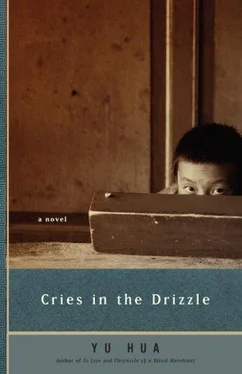The two of them went inside and began to confer in whispers. When they emerged, both wore grim expressions. The following morning, the first day of the Chinese New Year, father and son set out to visit the family of the boy whose life had been saved.
Now that he had lost hope of becoming a hero's father Sun Kwangtsai drew inspiration from the prospect of monetary gain. He demanded that the family provide compensation for Sun Guangming's death, to the tune of five hundred yuan. Shocked by this exorbitant figure, the boy's kinfolk told their visitors that there was no way they could pay that kind of money. They reminded them that it was New Year's Day and asked them to please postpone discussion of the matter until another time.
The two guests insisted that the sum be paid immediately; otherwise they would smash all their furniture. Sun Kwangtsai said, “We're already doing you a favor by not demanding interest.”
Although I was nowhere near, the noise of the quarrel carried so far that I knew exactly what was happening. Later I could hear further commotion as my father and brother wrecked their house.
Two days later, three men in police uniform arrived in the village. We were having lunch, and some little boys came running up to the door, shouting, “Sun Kwangtsai, men in uniforms are here!”
When my father rushed out, broom in hand, he saw the three policemen walking in his direction and immediately put two and two together. “Are you here to make an arrest?” he bellowed.
This was Sun Kwangtsai at his most majestic. “Who do you think you are dealing with?” he shouted. Pounding his chest, he cried, “I am the hero's father.” Then he pointed at Guangping. “That's the hero's brother.” Then at my mother: “That's the hero's ma.” He glanced at me, standing off to one side, but offered no comment on my status. “So just who do you plan to arrest?”
The policemen were not the least bit impressed and simply asked coldly, “Which of you is Sun Kwangtsai?”
“I am!” cried Father.
“Come with us,” they said.
All along my father had been looking forward to the arrival of men in suits, but it was men in police uniforms who greeted him in the end. After he was led away, the production team leader came to see us, along with people from the house that had been vandalized, and announced to my brother and mother that we had to compensate them for their losses. I went over to the pond behind our house and watched our possessions being carted off.Items that had been purchased with such difficulty after the fire now became other people s property.
A fortnight later, when my father was released from jail, he was as white and shiny as a baby fresh from its mother s womb. In the past so coarse and slovenly, he now walked toward us as delicate and dainty as a town official. He would declare to all and sundry that he was going off to Beijing to protest the treatment he had suffered, but when people asked him how soon he would be leaving he told them that he needed to wait three months until he could cover his travel expenses. But three months later he had still not set off for the capital. Instead he had clambered into the bed of the widow whose house was diagonally opposite ours.
The image of the widow that lingers in my mind is of a woman in her forties, sturdy, full throated, striding rapidly along the path between the fields in her bare feet. Her most notable trademark was that she always tucked her blouse inside her trousers, with the result that her large bottom was invitingly conspicuous. For the widow to wear her clothes that way made her stand out, because in those days even an innocent young girl would not have dared so openly to flaunt her waist and buttocks. The widow had no waist to speak of, but the sway of her fleshy bottom conveyed a potent allure. Her chest failed to provide a comparable visual interest, replicating instead the flatness of the concrete streets in town. I remember Old Luo saying that the flesh on her chest had all moved to her behind. “That has its advantages,” he added. “If you pinch her ass, you're getting to squeeze her tits too.”
When I was young, as people knocked off in the afternoon, I would often hear the widow making a generous offer to some young man of the village: “Come over to my place tonight.”
The answer was always the same: “Who the hell wants to go to bed with you? That thing of yours has gone all slack.”
At the time I didn't understand what was meant, and only as I grew older did I begin to know more about the widow's happy life of sensuality. Then I heard the following joke. A man climbs through the window one night and gropes his way to the foot of her bed. Amid sounds of frantic panting and moans of ecstasy the widow is heard to murmur, “Not now, I have company.” As the latecomer slips away, she delivers a piece of sound advice: “Come a bit earlier tomorrow.”
This joke actually did make a point — namely that after dark the widow's bed was seldom anything less than fully occupied. Even on the most sweltering summer night the sound of the widow's groans would float over to the drying ground where the villagers were trying to cool off. This supplied Old Luo with more grist for his mill: “Such a hot night, too — she's really a Model Worker.”
Tall and fit as she was, the widow liked to sleep with young men, and in my mind's eye I can still picture her shouting lustily to the village women from her end of the field: “Young guys have lots of stamina, they're clean, and no bad breath.”
But when the former production team leader, then in his fifties (later to die of tuberculosis), arrived outside her bedroom, she received him with equal alacrity. At times she had to defer to authority, after all. Later on, her looks began to fade and she put out the welcome mat for middle-aged men more generally.
It was at this point in time that my father Sun Kwangtsai, as though motivated by some philanthropic impulse, clambered into the widow's now more lonely wooden bed. It was an afternoon early in the spring when my father entered the widow's house, bearing a large sack of rice on his back. She was sitting on a stool sewing shoes and she watched him out of the corner of her eye as he came in.
A grin on his face, my father dumped the bag of rice at her feet, then made as if to enfold her in a bear hug.
She stuck out an arm to repel his advances. “Hang on a minute there! I'm not so easily bought,” she said. She reached out a hand and felt around in his crotch.
“Well?” said my father with a leer.
“It'll do,” she responded.
After leading a respectable life for so long, my father found that his inhibitions had been weakened by the shattering of illusions and the tricks that life had played on him. From now on Sun Kwangtsai would often go about sharing his newfound wisdom with the village youths, saying in the smug tones of a man of experience, “While you're still young, you should make the most of it and sleep around as much as you can. Everything else is a scam.”
When he clambered so confidently onto the widow's ornate antique bed, this did not go unnoticed by Sun Guangping. Father's brazen visits to the widow's home provoked great chagrin on his part. One day, after my father had wined and dined to his satisfaction and was preparing to set off for the widow's house to digest his meal, my brother spoke up. “You should have had enough by now, surely.”
My father didn't let this faze him in the slightest. “You can never have enough of that,” he said.
So day after day Sun Kwangtsai would march briskly into the widow's house, emerging some time later a good deal worse for wear. Moved by a morbid curiosity, I stealthily observed my mother and tried to gauge her reaction to events. My mother, who said little but whose hands and feet were perpetually in motion, bore the humiliation in silence, as though it was a matter of complete indifference to her. I wondered what went through her mind late at night, when Sun Kwangtsai would leave the widow's side and clamber into her bed. Here my thoughts would linger, and though my speculations were fueled in part by malice, I felt sorry for her at the same time.
Читать дальше












